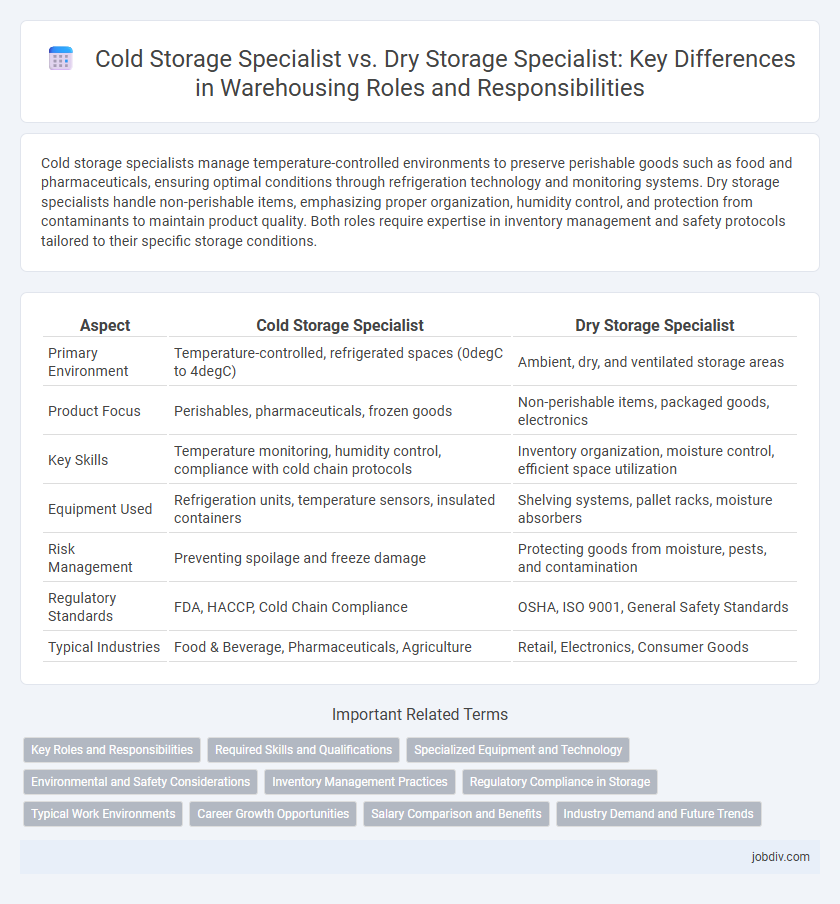Cold storage specialists manage temperature-controlled environments to preserve perishable goods such as food and pharmaceuticals, ensuring optimal conditions through refrigeration technology and monitoring systems. Dry storage specialists handle non-perishable items, emphasizing proper organization, humidity control, and protection from contaminants to maintain product quality. Both roles require expertise in inventory management and safety protocols tailored to their specific storage conditions.
Table of Comparison
| Aspect | Cold Storage Specialist | Dry Storage Specialist |
|---|---|---|
| Primary Environment | Temperature-controlled, refrigerated spaces (0degC to 4degC) | Ambient, dry, and ventilated storage areas |
| Product Focus | Perishables, pharmaceuticals, frozen goods | Non-perishable items, packaged goods, electronics |
| Key Skills | Temperature monitoring, humidity control, compliance with cold chain protocols | Inventory organization, moisture control, efficient space utilization |
| Equipment Used | Refrigeration units, temperature sensors, insulated containers | Shelving systems, pallet racks, moisture absorbers |
| Risk Management | Preventing spoilage and freeze damage | Protecting goods from moisture, pests, and contamination |
| Regulatory Standards | FDA, HACCP, Cold Chain Compliance | OSHA, ISO 9001, General Safety Standards |
| Typical Industries | Food & Beverage, Pharmaceuticals, Agriculture | Retail, Electronics, Consumer Goods |
Key Roles and Responsibilities
Cold Storage Specialists manage temperature-controlled environments to preserve perishable goods, ensuring strict compliance with safety and hygiene standards while monitoring refrigeration systems. Dry Storage Specialists oversee non-perishable inventory, optimizing space utilization, managing stock rotation, and maintaining inventory accuracy through effective warehousing techniques. Both roles require expertise in inventory management systems but differ primarily in handling temperature-sensitive versus ambient storage conditions.
Required Skills and Qualifications
Cold Storage Specialists require expertise in temperature-controlled environments, knowledge of refrigeration systems, and skills in handling perishable goods to maintain product integrity. Dry Storage Specialists must have proficiency in inventory management, organization of non-perishable items, and familiarity with safety protocols for hazardous materials. Both roles demand strong attention to detail, effective communication skills, and compliance with regulatory standards specific to their storage conditions.
Specialized Equipment and Technology
Cold Storage Specialists utilize advanced refrigeration systems, temperature-controlled environments, and humidity regulation technology to preserve perishable goods, ensuring product quality and safety. Dry Storage Specialists rely on optimized shelving units, automated inventory management systems, and environmental controls that maintain consistent ventilation and cleanliness for non-perishable items. Both roles leverage warehouse management software (WMS) and barcode scanning technology to improve inventory accuracy and operational efficiency within their respective storage types.
Environmental and Safety Considerations
Cold storage specialists manage temperature-controlled environments to prevent spoilage and maintain product integrity, requiring strict monitoring of refrigeration systems and regular safety checks to avoid hazards like frostbite or ammonia leaks. Dry storage specialists ensure optimal ventilation, humidity control, and pest prevention to protect non-perishable goods, emphasizing fire safety and structural integrity to reduce contamination and damage risks. Both roles demand adherence to OSHA regulations and implementation of standard operating procedures to promote worker safety and environmental compliance in warehousing facilities.
Inventory Management Practices
Cold Storage Specialists implement precise temperature monitoring and humidity control to preserve perishable inventory, ensuring quality and compliance with safety standards. Dry Storage Specialists optimize shelf organization and stock rotation strategies to prevent contamination and extend product shelf life in ambient conditions. Both roles utilize advanced inventory management software to track stock levels, reducing waste and improving order fulfillment efficiency.
Regulatory Compliance in Storage
Cold Storage Specialists ensure strict regulatory compliance with temperature-sensitive storage standards, adhering to FDA and USDA guidelines to prevent spoilage and contamination of perishable goods. Dry Storage Specialists focus on maintaining optimal environmental conditions compliant with OSHA and local fire codes, preventing moisture damage and pest infestations while ensuring safe stacking and labeling according to industry regulations. Both roles require rigorous documentation and audit readiness to meet federal, state, and industry-specific storage compliance mandates.
Typical Work Environments
Cold Storage Specialists typically work in refrigerated or frozen warehouse environments where temperature control is critical to preserving perishable goods like food, pharmaceuticals, and chemicals. Dry Storage Specialists operate in ambient temperature warehouses designed for non-perishable items such as electronics, clothing, and packaged goods, focusing on optimal organization and inventory management. These differing environments demand distinct safety protocols and equipment suited to the specific storage conditions and product types.
Career Growth Opportunities
Cold Storage Specialists typically experience faster career growth due to the increasing demand for perishable goods management and specialized refrigeration skills, leading to roles like Cold Storage Manager or Temperature-Controlled Logistics Coordinator. Dry Storage Specialists often advance into inventory control, supply chain optimization, and warehouse operations management, benefiting from broader storage solutions expertise. Both careers offer distinct pathways, with cold storage roles focusing on advanced technology and compliance, while dry storage emphasizes scale and efficiency in warehouse distribution.
Salary Comparison and Benefits
Cold storage specialists typically earn higher salaries than dry storage specialists due to the specialized handling of perishable goods and strict temperature controls, with average pay ranging from $45,000 to $65,000 annually. Benefits for cold storage roles often include health insurance, hazard pay, and climate-controlled work environments, while dry storage specialists usually receive standard warehouse benefits such as paid time off and retirement plans. Salary differences reflect the increased risk and skill level required for cold storage management compared to handling non-perishable inventory in dry storage.
Industry Demand and Future Trends
Cold Storage Specialists are in high demand due to the rapid growth of the pharmaceutical and food industries requiring precise temperature-controlled environments, with forecasts indicating a 7% annual industry growth through 2027. Dry Storage Specialists maintain critical roles in sectors like retail and manufacturing, where consistent humidity and temperature are essential for preserving product quality, experiencing steady demand aligned with global supply chain expansions. Future trends emphasize increasing automation and IoT integration in both cold and dry storage, driven by the need for real-time monitoring and energy-efficient operations to meet evolving industry standards.
Cold Storage Specialist vs Dry Storage Specialist Infographic

 jobdiv.com
jobdiv.com